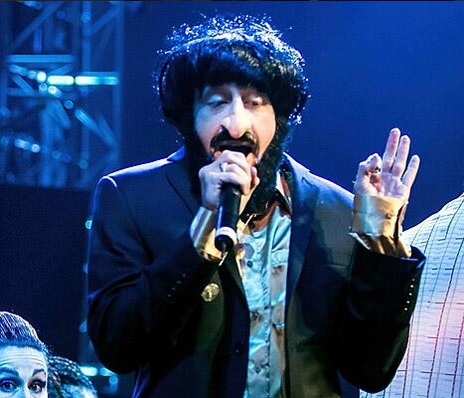What Did Macklemore Do?
Last week, Macklemore made headlines for performing in a fake black wig, beard and hooked nose, a look many felt was reflective of a stereotypical Jewish caricature. After seeing photos, I'll have to say I agree that the look fits the form; all he was missing was payot and a yarmulke. It probably does not help that the Seattle-based rapper was singing his smash hit about thrift shopping. As someone who has studied the relationships between race, music and culture, these events and their responses always fascinate me. As a person of Jewish descent, this one doubly fascinated me.
The Problem With Our View on Race and Culture
At a small party in college, one of my friends told me he had been talking to a classmate of mine earlier in the evening. When I asked him who it was, he had forgotten her name. What followed was an uncomfortable mash-up of vague adjectives as he tried to describe her to me. "She's medium height, longish darkish hair, dangly earrings... a dress." While his descriptions didn't help, his discomfort did. "Is she black?" I asked. He quickly looked around the room to make sure no one heard me, then began to quietly yell at me about being racist. After a brief discussion, we agreed to disagree on the matter.
The Difference Between Describing and Defining
We need to shift how we think and talk about race (and sex, gender, religion, sexual orientation, ethnicity). There is a fundamental difference between describing a characteristic of someone and defining someone by that characteristic. There is nothing wrong with describing a person as black or white or Jewish, just like there's nothing wrong with describing someone as having brown hair or a red shirt. The phrase, "a person who..." is crucial. A person who is gay. A person who is Chinese. They are a person, and that person has a particular characteristic (among others).
Where we get into trouble is when we define people by certain characteristics. Like by saying "the Jewish guy," defining him as greedy (or because of a big nose) or "the Muslim," implying that someone is a terrorist. "The fat girl," "the skinny guy," "the blonde," "the slut." The practice of putting someone in a box because of a characteristic, regardless of what it is, is harmful.
Color Blindness and the Problem with Taboos
To avoid "accidentally saying something racist," the concept of color blindness has widely been adopted. Exactly like my friend's belief: "don't say 'black' when talking about someone." While this perspective may be well-intended, here's the kicker: This point of view is incredibly racist. By making it taboo to describe someone as being black, there is an implication that there is something wrong with being that. (i.e., don't call him black because it's bad to be black, thus you'd be offending him by calling him black). When our kids innocently describe someone as "black", we tell them to hush. We have just planted an idea in their mind that races are different and shouldn't be talked about, just at the time when they are trying to understand the world.
Why Was Macklemore's Costume Offensive?
So with all of that said, why was Macklemore's costume offensive? Because it perpetuated harmful stereotypes of Jews. The next part of the answer is the most important. Given what I wrote previously, it's fair to ask the question, "It was just a wig, a beard, and a nose. How does that constitute him "defining Jews" in a harmful way?" To answer this, we need to take a quick look at the root of these stereotypes and how they've been used to oppress a group of people.
The Root of Stereotypes of Jews
Many of these stereotypes date back to the Middle Ages. When the Church made charging interest illegal, Jews often worked as usurers, largely providing loans to Christians. This societal role led to the association between Jews, money and what was seen as a greedy practice. Like many stereotypes, these associations would be exploited to suppress Jews in many societies throughout history. Jews became stereotyped as frugal, dishonest, menacing, money-obsessed, and scheming. Inferior. Without the defining characteristics that skin color or gender provide, Jews became depicted in the media with extremely exaggerated features, including curly black hair, large hook-noses, hairy bodies, and dark beady eyes. They were often depicted with other deformities, including warts, boils or even devil-like horns.
Centuries after their conception, these stereotypes became a hallmark of Nazi propaganda during World War II. Much of the propaganda used these stereotypes to support claims that Jews were of an "inferior" race. If this Macklemore incident showed anything, it's that even 70 years after the end of WWII, these Jewish stereotypes are still easily identified today. And the attitudes may still be pervasive as well. A 2009 survey by the Anti-Defamation League found that 13 percent of respondents believed that "Jews are more willing than others to use shady practices to get what they want," and 12 percent believed that "Jews are not as honest as other businesspeople."
Do Intentions Matter?
While some people may disagree, I do believe intentions matter. Whether his attire was intentional or random, I don't believe that Macklemore meant to hurt anyone. That being said, I think it showed his ignorance, and ignorance can be very dangerous. Whether he meant to or not, he was perpetuating some stereotypes that have been immeasurably harmful to a group of people over their history and into present times.
But questioning the intent raises some other questions: If his costume really was random then was the response racist? People were very quick to call out that he was "a Jew." Communication requires both a sender and a receiver. What does it say about our society that we latched onto this so easily? Would they have said that if he was only wearing the nose? Or perhaps the nose with red hair (red hair is a common Jewish stereotype in Eastern Europe and Russia, but not in Western Europe or the U.S.)? Better yet, what if it was well known that Macklemore was Jewish? Would we still be calling him anti-Semitic? While the topics of boundaries and re-appropriation are better saved for another piece, the questions are interesting to consider.
Is Macklemore Anti-Semitic?
Immediately after the "incident" many publications and tweets emerged calling Macklemore anti-Semitic. By definition, this would imply that he is prejudice, hates or discriminates against Jews. While I don't know him personally, I don't believe he is anti-Semitic. I think he made a poor decision. He did something that was offensive to many people. But does that define him as an anti-Semite? To quote poet Buddy Wakefield, "I am better than the worst thing I have ever done." I don't think one bad costume choice should define who Macklemore is as a person or an artist just like "being Jewish" shouldn't define anyone either.
In Conclusion
In Man's Search for Meaning, Viktor Frankl writes, "Everything can be taken from a man but... the last of the human freedoms -- to choose one's attitude in any given set of circumstances, to choose one's own way." So while Macklemore's costume was quickly met with anger, superiority and hate, my hope is that in the future, we can choose to address these issues with empathy, understanding and education. Only then will we be able to move beyond the boxes that these stereotypes have imposed upon all of us for too long.


